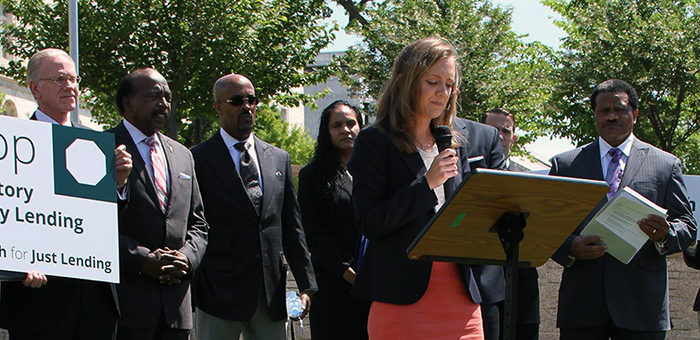
The National Association of Evangelicals (NAE), as the largest evangelical network in the country, brings together 40 evangelical denominations with more than 45,000 congregations, as well as ministries, missions, colleges, universities, seminaries, charities and networks, with millions of constituents. We have seen the devastation that predatory lending has wrought in too many families and communities.
In 2014 the NAE adopted a resolution calling on the Consumer Finance Protection Bureau (CFPB) “to investigate predatory lending abuses and to establish just regulations that protect consumers, particularly the most poor and vulnerable, from exploitation.” We are grateful to the CFPB for proposing a rule that, if further strengthened, finalized and enforced, would rein in some of the worst abuses.
In 2015 the National Association of Evangelicals joined other denominations associations and faith-based organizations to establish Faith for Just Lending, a broad coalition of faith groups concerned about predatory lending. The Faith for Just Lending Statement of Principles calls on government to prohibit usury and predatory or deceptive lending practices.
Faith for Just Lending, in partnership with Lifeway Research, conducted a national poll of evangelicals who live in 30 states that allow predatory payday and car title lending to operate freely. The resulting report, “Collateral Consequences of Payday Loan Debt” found that:
- 77 percent of Christians believe that it is a sin to loan money in a harmful manner.
- 94 percent agreed that lenders should extend loans at reasonable interest rates and based on the borrower’s ability to repay.
- 86 percent believe that laws or regulations should prohibit lending at excessive interest. The CFPB cannot set a rate cap but states and Congress can and should.
- 80 percent believe that laws or regulations should protect borrowers from loans that cannot be repaid. The CFPB can and is working on doing this and should not be stopped.
Our report also found that for longer-term loans some payday lenders have been shifting to making triple-digit interest rate loans with loan terms of many months or years. These longer term high interest rate loans lead to the same harms as any other payday loans — borrowers struggle to make other payments, and lenders keeping borrowers in loans that are structured to be impossible to repay. For example, in Colorado, where payday loans are required to have a 6-month loan term, we received this story, noted in the attached report:
A pastor in a United Brethren congregation in Colorado shared the story of a single mother who signed loan documents she did not understand and found herself trapped in increasing debt to a payday lender. “The members of the congregation rallied around her to help pay off the payday loan … After several months of working together, they finally paid it off.”
We oppose the provision in the Financial Choice Act that seeks to prohibit the CFPB from any “rulemaking, enforcement, or other authority with respect to payday loans, vehicle title loans, or other similar loans.” We support a strong payday rule with a loophole-free ability to repay standard. Many of our constituents submitted comments to the CFPB urging that the final rule be strengthened to prevent abuse of vulnerable borrowers. We are united in our efforts to see predatory lending practices ended.
We support small dollar lending on reasonable terms and interest rates that borrowers can afford to pay. In 2006 Congress passed the Military Lending Act limiting interest rates on loans to service members to an annual rate of 36 percent. Congress should extend similar protection to all Americans.
We urge Congress to reject any provision in the Financial Choice Act that would prevent the CFPB from finalizing and enforcing a strong rule protecting vulnerable people from predatory lending practices.



 View All Updates
View All Updates 


